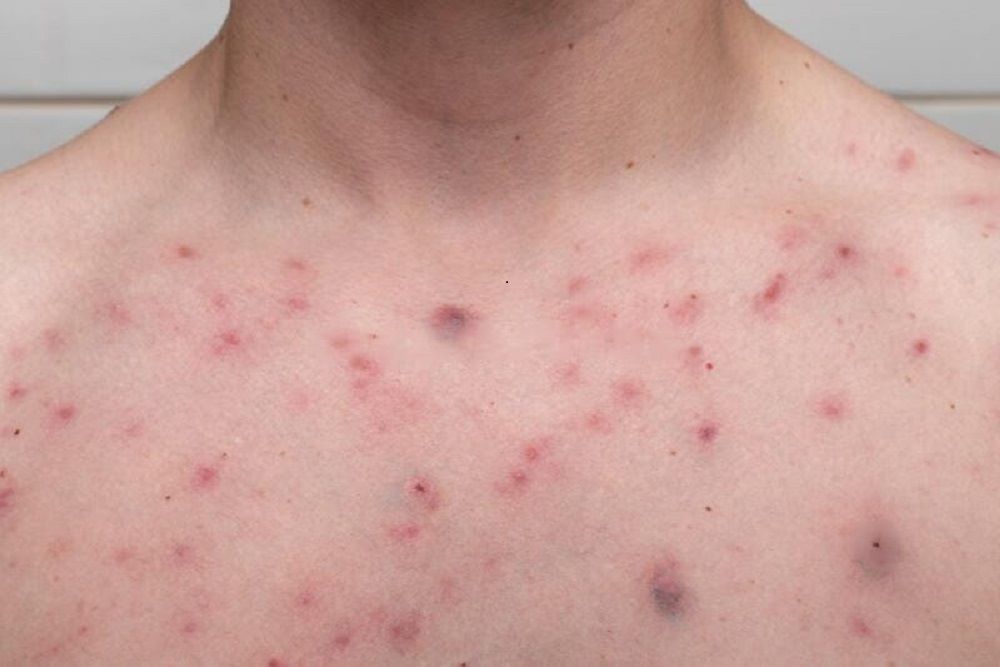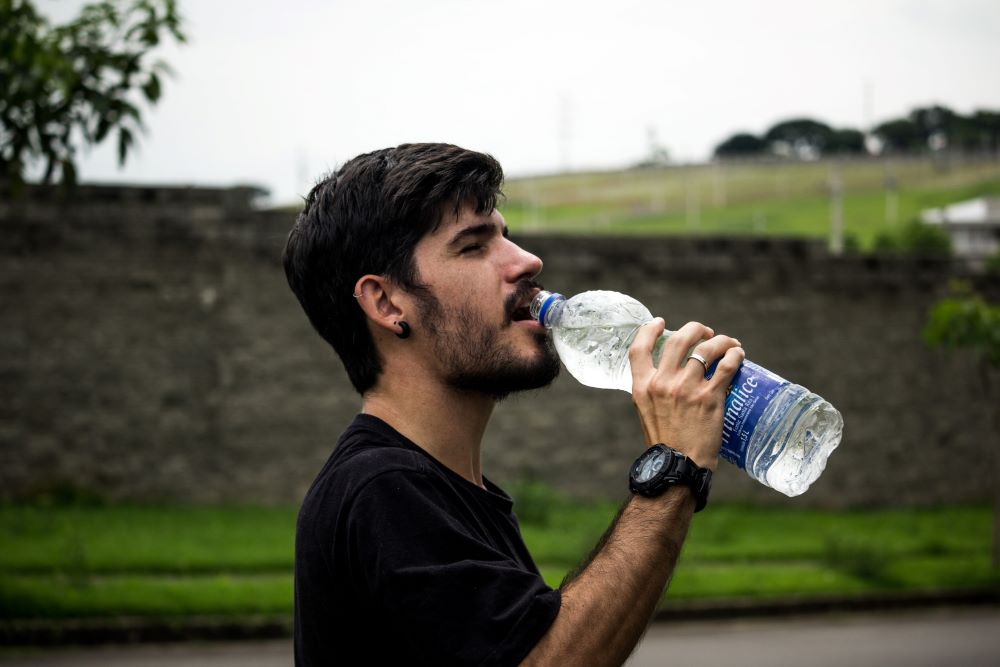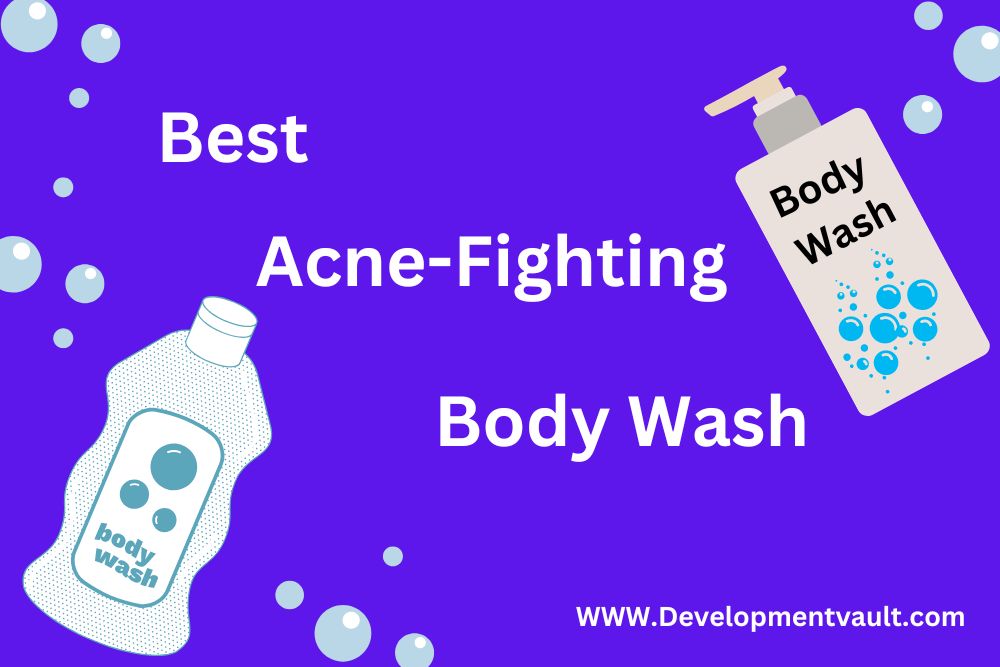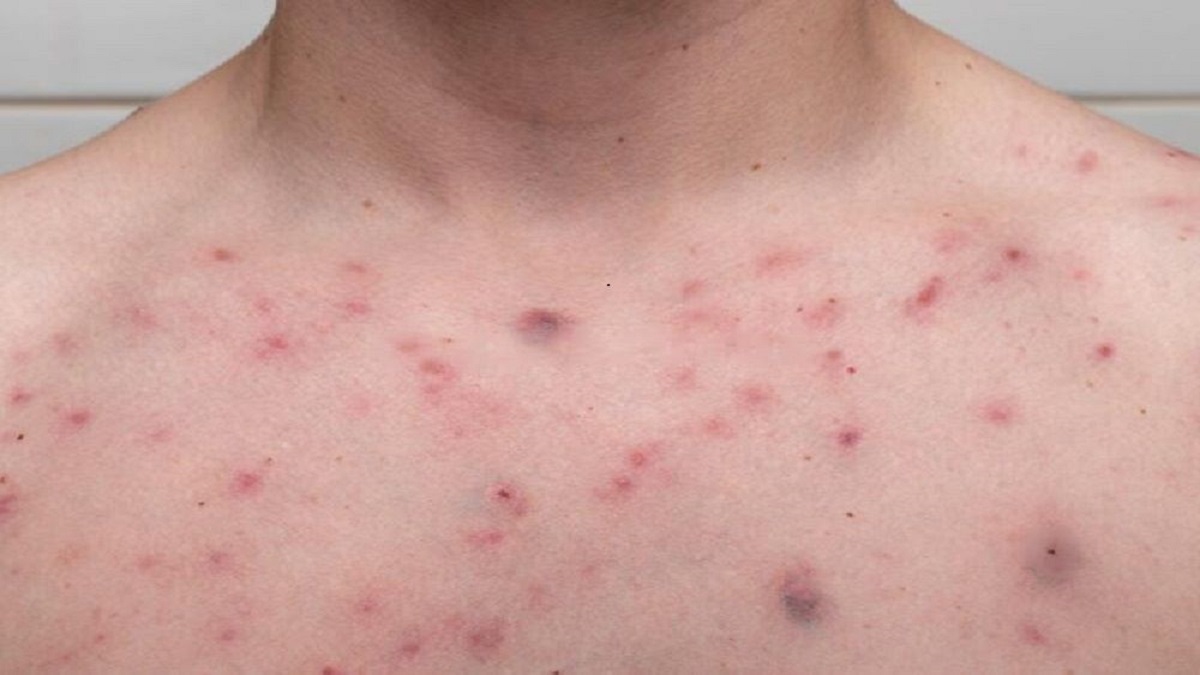Contents
- 1 What Causes Chest Acne?
- 2 When Does Chest Acne Go Away?
- 3 How To Get Rid Of Chest Acne?
- 4 FAQs (Frequently Asked Questions)
What Causes Chest Acne?

Chest acne, similar to facial acne, is primarily caused by the overproduction of oil (sebum) in the skin’s sebaceous glands. These glands are more prevalent in areas with a higher concentration of hair follicles, such as the chest. When excess sebum combines with dead skin cells and other impurities, it can clog the hair follicles and pores, creating an environment conducive to bacterial growth.
Several factors contribute to the development of chest acne:
- Hormonal fluctuations: Hormones, particularly androgens like testosterone, can stimulate the sebaceous glands to produce more oil. Hormonal changes during puberty, menstrual cycles, pregnancy, and other conditions can lead to increased acne activity.
- Genetics: A family history of acne can make individuals more prone to developing chest acne.
- Friction and irritation: Tight clothing, backpack straps, or constant friction on the chest can aggravate the skin, leading to acne breakouts.
- Sweat and heat: Sweating can mix with bacteria and dead skin cells, exacerbating acne in hot and humid climates.
- Poor hygiene: Infrequent showering or neglecting to cleanse the chest area can contribute to the accumulation of oil, dirt, and bacteria.
- Certain skincare products: Using products that are comedogenic (tend to clog pores) or irritate the skin may trigger acne breakouts.
- Diet: Some studies suggest that high-glycemic diets and dairy consumption may be associated with an increased risk of acne.
- Medications: Certain medications, such as steroids or lithium, can also cause acne as a side effect.
Understanding the underlying causes of chest acne can help individuals adopt appropriate preventive measures and seek suitable treatments to get rid of chest acne and alleviate the condition effectively. If chest acne becomes severe or persistent, consulting a dermatologist is recommended for personalized advice and treatment options.
When Does Chest Acne Go Away?
The duration for chest acne to go away can vary significantly from person to person and depends on various factors, including the severity of the acne, individual skin type, and the treatment methods employed. In many cases, chest acne can clear up on its own with proper skin care and lifestyle adjustments. However, it may take weeks to months for noticeable improvements to occur.
Mild cases of chest acne may resolve relatively quickly with consistent and gentle skincare practices, such as:
- Regularly cleansing the chest area with a mild, non-comedogenic (non-pore-clogging) cleanser.
- Avoiding excessive scrubbing or harsh exfoliation, which can aggravate the skin.
- Wearing loose-fitting clothing made of breathable fabrics to reduce friction and irritation.
- Showering after sweating, especially after exercise or exposure to hot and humid conditions.
- Avoiding the use of comedogenic or heavy skincare products on the chest.
- Maintaining a balanced and healthy diet, potentially avoiding trigger foods if they worsen acne.
For more stubborn or severe cases of chest acne, medical intervention may be necessary. A dermatologist can provide tailored treatment options, which may include:
- Topical acne medications: Prescription-strength topical treatments like benzoyl peroxide, retinoids, or salicylic acid can help unclog pores and reduce inflammation.
- Oral medications: In some cases, oral antibiotics or hormonal medications (for hormonal acne) may be prescribed to target bacteria or regulate hormone levels.
- Chemical peels: Dermatologists may perform chemical peels to exfoliate the skin and improve acne.
- Laser or light therapy: Certain light-based treatments can be effective in reducing acne and inflammation.
- Isotretinoin (Accutane): This potent oral medication is reserved for severe and resistant cases of acne but requires close medical supervision due to potential side effects.
It’s essential to be patient and consistent with any chosen treatment regimen. If chest acne persists or worsens despite efforts to manage it, consulting a dermatologist is advisable for a comprehensive evaluation and personalized treatment plan. With the right approach, chest acne can significantly improve or resolve, leading to clearer and healthier skin.
How To Get Rid Of Chest Acne?
Indeed, with some simple changes to your daily routine and an improved skincare regimen, you can effectively get rid of chest acne in a relatively short time. Here are some of the best and most effective ways to combat chest acne:
1. Stay Hydrated

Indeed, dehydration can contribute to chest acne, as well as other skin issues. Therefore, incorporating an ample amount of water into your daily routine can play a vital role in getting rid of chest acne and maintaining overall skin health.
Water is an essential component in preserving the natural glow of our skin and combating body acne, including chest acne. Dermatologists often recommend their patients stay well-hydrated by drinking plenty of water daily. Hydration offers numerous benefits to our bodies, including promoting radiant skin and assisting in the reduction of facial pimples.
By maintaining proper hydration levels, you can help your skin reveal its inherent beauty and luminosity. Additionally, being adequately hydrated throughout the day can leave you feeling more energized and refreshed.
One of water’s significant advantages is its ability to flush out toxins from our system. When we sweat, our bodies eliminate waste, which is conducive to healthier skin. By consuming at least 8-9 glasses of water daily, you can avail yourself of its benefits and aid in eliminating chest acne.
Remember, drinking enough water is a simple yet effective step toward healthier skin and overall well-being. Make it a habit to stay hydrated, and you’ll be supporting your skin’s natural radiance while contributing to your body’s optimal functioning.
2. Use An Acne-Fighting Body Wash

Absolutely, using an acne-fighting body wash can be incredibly beneficial in combating chest acne and other skin issues. These specialized body washes are designed to target acne, removing body pimples, acne scars, and other blemishes effectively. Chest acne can often result from the accumulation of excess oil and toxins within the skin’s pores, making it crucial to address these impurities to prevent breakouts.
Acne-fighting body washes typically contain active ingredients like salicylic acid or benzoyl peroxide, which are known for their efficacy in treating acne. These ingredients work to gently exfoliate the skin, sloughing away dead skin cells and unclogging pores. By doing so, they help remove existing acne while also preventing new breakouts from forming.
To maximize the benefits, it is recommended to use an acne-fighting body wash at least four times a week, as consistency is key to maintaining clear skin. However, it’s essential to strike a balance, as excessive exfoliation can irritate the skin and exacerbate the problem. If your skin becomes overly dry or sensitive, consider reducing the frequency of use and opting for a milder body wash.
Pairing the use of an acne-fighting body wash with other good skincare practices, such as moisturizing and staying hydrated, can further enhance its effectiveness. Additionally, adopting a healthy lifestyle and a balanced diet can contribute to overall skin health and reduce the likelihood of chest acne.
Overall, incorporating an acne-fighting body wash into your skincare routine can be a valuable step in achieving clearer, healthier skin and preventing future breakouts on the chest and body. As with any new product, it’s advisable to patch-test on a small area of skin first to ensure compatibility and minimize the risk of any adverse reactions.
Best Acne-Fighting Body Wash For Everyone & Simple Acne Routine
1. Cetaphil Ultra Gentle Refreshing Body Wash
It is the best body wash for acne provided by Cetaphil company. This body wash is mostly suitable for sensitive skin types. It contains aloe vera gel and marigold etract. It also contains vitamin B5 which helps to improve and make our skin better. This body wash is fragrance-free body wash. Gently purifies the body without leaving the skin feeling dry. Dermatologist recommended for Sensitive Skin.
2. Eucerin Advanced Cleansing Body & Face Cleanser
Eucerin Advanced Cleansing Body & Face Cleanser is fragrance-free and soap free. It is suitable for dry, sensitive, and normal skin. It provides you with 2-in-1 benefits: for the face and body also. Noncomedogenic, and dye-free. Rinses clean without any residue. The rating of this cleanser is also good on e-commerce platforms like Amazon and Flipkart.
3. Vanicream Gentle Body Wash
Gentle cleansing: Vanicream body wash for sensitive skin is a gentle cleanser that helps remove dirt and oils without drying the skin. Dermatologist tested: Vanicream products are formulated with ingredients dermatologists consider desirable and not irritating or sensitizing to the skin; awarded the Seal of Acceptance from the National Eczema Association.
4. CaraVe Body Wash
CeraVe body wash is suitable for dry skin. It is a moisturizing body wash with hyaluronic acid and ceramides. It is paraben, sulfate, and fragrance-free. CeraVe skincare is developed by dermatologists. Fragrance-free, paraben-free, sulfate-free, soap-free, allergy-tested, and non-comedogenic. Accepted by the National Eczema Association.
3. Reduce Your Stress Level

Indeed, stress can be considered the greatest foe of humanity, impacting various aspects of our lives, including our skin health. Chest acne can be a consequence of increased stress levels, as stress triggers the production of hormones called androgens that affect different parts of the body, including the skin. In the skin, these hormones can stimulate the oil glands and hair follicles, leading to heightened acne growth and inflammation.
Experiencing excessive stress not only affects our skin but can also have detrimental effects on our overall well-being. It can take a toll on our mental and physical health, and in severe cases, prolonged stress may lead to more serious consequences.
To combat chest acne and improve overall health, it is essential to manage stress effectively. Engaging in activities that help reduce stress can make a significant difference. Spending quality time with family or immersing oneself in nature can offer relaxation and peace. Additionally, practices like deep breathing exercises, or mindfulness meditation can be beneficial in reducing stress levels and calming your mind.
Prioritizing self-care and finding healthy ways to cope with stress can promote emotional and physical well-being, which in turn may contribute to clearer and healthier skin. Remember, taking proactive steps to manage stress not only benefits your skin but also promotes a more balanced and fulfilling life.
4. Eat Healthy food For Skin Care

Indeed, maintaining a healthy and balanced diet can play a vital role in getting rid of chest acne and improving overall skin health. A healthy diet can also help an individual physical development. Consumption of excessive junk food has been linked to acne breakouts, as it often contains high amounts of oil and unhealthy fats, which can negatively impact the skin.
Choosing a diet rich in protein, vitamins, and essential minerals can contribute to physical development and positively influence skin health. Foods with high nutritional value can support the body’s natural healing processes and promote clearer, more radiant skin.
To combat chest acne, consider incorporating the following foods into your diet:
- Green vegetables: Green leafy vegetables like spinach, kale, and broccoli are rich in vitamins and antioxidants that support skin health.
- Fruits: Avocado, which is a nutrient-dense fruit, provides essential fatty acids that nourish the skin and contribute to its natural glow. Other fruits like cauliflower, cucumber, and berries are also excellent choices for promoting skin health.
- Lean proteins: Foods like fish, chicken, turkey, and legumes provide essential amino acids necessary for skin repair and rejuvenation.
- Nuts and seeds: Almonds, walnuts, chia seeds, and flaxseeds are good sources of healthy fats, which contribute to skin hydration and overall health.
By avoiding excessive consumption of junk food and incorporating more nutritious options into your diet, you can positively impact your skin’s health and work towards a clearer complexion. Remember, a healthy diet not only benefits your skin but also promotes overall well-being, contributing to a more vibrant and fulfilling life.
4. Start Taking Cold Water Shower

Cold water showers offer numerous benefits to our skin and overall well-being. One of the advantages is its potential to prevent dandruff on the head, ensuring a healthier scalp. When you shower with cold water, it causes your pores to constrict, reducing the overproduction of sebum and minimizing the excretion of acne-causing bacteria. This can be particularly helpful in managing chest acne, as it aids in maintaining a balanced and healthy skin environment.
In contrast, hot water showers tend to extend the pores, which can exacerbate skin irritation and make it more susceptible to acne. By incorporating cold water showers into your routine at least 3-4 times a week, you can help combat chest acne and promote clearer skin.
Additionally, cold water showers have a positive impact on stress levels. The refreshing and invigorating sensation of cold water can have a calming effect on the body, reducing stress and tension. As mentioned earlier, stress can contribute to acne breakouts, so managing stress through cold water showers can indirectly support healthier skin.
Moreover, taking cold water showers can add a natural glow to your face and effectively remove dust particles from your skin. This refreshing experience can leave you feeling revitalized and rejuvenated.
Remember, while cold water showers offer various benefits, it’s essential to strike a balance and be mindful of your body’s needs and comfort. Some individuals may prefer warm water for certain situations, and that’s perfectly acceptable. The key is to find a routine that suits your skin and promotes well-being. Incorporating cold water showers into your weekly routine can be a simple yet effective step towards better skin health and overall vitality.
5. Wear Comfortable And Breathable Fabrics
Wearing comfortable and breathable fabrics can indeed play a significant role in getting rid of chest acne. The choice of clothing can impact the skin’s health, especially in areas prone to acne breakouts. Opting for comfortable and loose-fitting clothes can provide several benefits that promote clearer skin and prevent acne flare-ups.
When you wear uncomfortable or tight clothing, it can trap sweat and moisture against the skin, creating a conducive environment for bacterial growth. This can lead to clogged pores and acne breakouts on the chest or other parts of the body. In contrast, wearing loose and breathable fabrics allows air circulation and helps control bacteria growth, reducing the likelihood of acne development.
Rough or tight fabrics can cause friction against the skin, which may lead to irritation and exacerbate existing acne. On the other hand, breathable fabrics like cotton are gentle and soft on the skin, minimizing friction and helping to prevent breakouts.
Incorporating comfortable and breathable clothing, especially those made from natural fibers like cotton, can contribute to overall skin health. These fabrics enable the skin to breathe and reduce the risk of irritation and inflammation, supporting a clearer and healthier complexion.
By making mindful choices in your clothing selection and opting for loose and breathable fabrics, you can create a more favorable environment for your skin, reducing the likelihood of chest acne and promoting greater comfort throughout the day. Remember, small lifestyle changes, like choosing the right clothing materials, can have a positive impact on your skin’s health and contribute to your overall well-being.
FAQs (Frequently Asked Questions)
Should I Pop Chest Acne?
No, you shouldn’t pop your chest acne. If you have acne on your body on any part like- on your face, on your back, etc. You shouldn’t pop that acne. It creates a big problem for your skin. The popping resulted in a large red blob. So, try to ignore it and create a proper skincare routine to get rid of chest acne.
How Do You Treat Chest Acne Naturally?
Tea tree oil is a fantastic natural treatment for cleaning the skin + destroying bacteria, making it an excellent natural solution for chest acne.
Is It Normal To Have Acne On Your Chest?
It is definitely a normal thing to have acne on your chest. Few people can treat chest acne with over-the-counter solutions and lifestyle transformations. Others may need to pursue medical remedies to help remove the acne.
Does Chest Acne Leaves Scars?
Chest acne can conduct to scarring if it is not treated correctly or if it is painful. Acne scars appear when the skin is injured and the body creates new collagen to improve it, leading to a scar. The type and harshness of scars can vary depending on the individual, the cause of the acne, and the type of treatment obtained.
Are Body Acne Scars Permanent?
Body acne scars can be permanent, but not forever. The permanence of a scar relies on various factors, such as the harshness of the initial injury, the age and fitness of the individual, and the type of medicine acquired. In some chances, scars may disappear over time and become less noticeable, while in others, they may stay prominent.

1 thought on “How To Get Rid Of Chest Acne? | Causes Chest Acne”